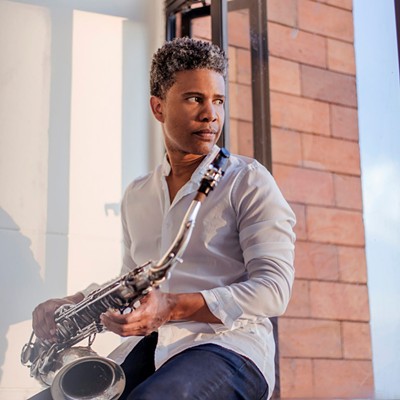The Setup:
Hail, Nina Stemme, goddess of opera! Hail, Houston Grand Opera for bringing her here! Hail, maestro Patrick Summers for a thrilling ride!
The Execution:
If you are, as I am, an unregenerate Wagnerite -- or for that matter a lover of any type of exceptional operatic singing, be it Wagner or any other composer -- there is reason for mighty celebration and a breathless run to Houston Grand Opera's presentation of Tristan und Isolde. You may not want to look at it, for director Christof Loy's production is misguided in conception and a dreary eyesore that drains all the seething passion out of the work (more on that later), but just close your eyes and revel in the beauty of sound and depth of interpretation that Ms. Stemme instills in the fiery princess of Ireland.
Any singer who can navigate through the heady waters of Richard Wagner and make it sound as easy as paddling a canoe across a calm lake is the rarest of the rare. Not every generation is so fortunately blessed. Herr Wagner's thick and rich vocal textures, which declaim through every register of the voice -- passionate curses that boom in the bass, sweeter melody in the middle, and other worldly passion on high -- are mine fields for the voice. Many singers have been wrecked on his shoals. The last truly stupendous Wagnerian soprano was Swedish Birgit Nilsson, who ruled his strenuous repertoire from the '50s through the '70s. Ms. Stemme, another Swede and another international interpreter of Wagner, can securely wrap herself in Ms. Nilsson's mantle. The fit is perfect.
Her voice is scrumptious, strikingly clean from top to bottom. It rings out with clarion purity, yet always warm and radiantly alive. No need for her to scoop to reach those Alpine summits that Wagner throws in her path, she gleefully leaps from peak to peak with supernatural grace and pinpoint precision. In the quieter passages, she caresses the musical line as if a lover enthralled. To top it off, she's a consummate actress, alive in every scene, no matter what nonsense the director has her do. Since the century's just begun, I am reticent to call her the "voice of the century," but I can proclaim with assurance that Ms. Stemme is most assuredly the voice of the decade.
Read More: Ryan McKinny Has Spent Years Getting Ready for Tristan and Isolde
Now, you can't have a complete Tristan and Isolde with only Isolde, no matter how radiantly sung. Sad to say, her Tristan, Canadian Ben Heppner, international operatic superstar and preeminent Wagner interpreter, is slogging through a rough patch lately. His voice, once trumpet bright, easily frays when pushed hard, and Wagner pushes hard. His gleaming heldentenor, still evident in softer scenes, is now arduously produced. With commanding reserve and a pro's experience, he miraculously made it through Tristan's mad scene -- one of any opera's most demanding arias -- and managed to resurrect past glory days. We pray Heppner overcomes these difficulties and resumes his rightful place in the Wagnerian pantheon.
Dominated by a depressing palette of black, white, and grey, director Loy, abetted by co-conspirators Johannes Leiaker (sets and costumes) and Olaf Winter (lighting), slaps all the drama out of Wagner's overwhelmingly expressive music. Forget about the galleon plowing through the stormy Irish sea, or the endless beauty of a night sky for the couple's escape into desire, or even the overgrown, untended castle gardens with their overlook to the sea where Tristan lies dying. Instead of a complement to Wagner's endlessly fascinating orchestration, we're treated to an interior mindscape as if watching The Last Days of Marienbad. Behind the immense curtain, which separates the sparse grey downstage, lies a sketch of a ballroom outfitted for a wedding reception. Wearing tuxedos, the chorus of sailors await the arrival of groom King Marke; Isolde wears an off-the-shoulder contemporary white bridal gown. They move in slow motion to suggest, I assume, that they're embodiments of somebody's psychological projections. The concept doesn't get any better. Instead of waiting in hot anticipation for her tryst with her lover in Act II, as the music feverishly depicts, Isolde prepares a neat little supper, arranging napkins and plates on a lone table against the steely side wall. Just close your eyes and drink deep of Wagner.
Maestro Summers closes his eyes to the stage pictures and paints a glorious panorama. He evokes every wave of Wagner's swirling soundscape that swells with ecstasy, fury, languor, and remorse with sublime clarity and marvelous empathy. He connects with this score on a very deep level, driving it forward as if he were the opera's third lover. HGO's orchestra has never sounded more lush and shimmery. He makes us hungry to hear his leadership of the upcoming Ring cycle, which begins next April.
The other members of the cast were downright revelatory, strong and powerful all down the line. Mezzo Claudia Mahnke brings velvety warmth to Brangne, Isolde's faithful lady-in-waiting who instigates wayward passion by substituting a love potion instead of the poison Isolde demands. Her warning to the illicit couple to be on guard, "Habet acht," caressed the night air with haunting premonition. Baritone Ryan McKinny could not have sung Kurwenal any better. As Tristan's trusted aide-de-camp with unbounded loyalty, McKinney, with handsome stage presence to spare and voice to die for, was positively riveting. (Anyone who can tie a bowtie while also maneuvering through Wagner is above reproach!) Bass Christof Fischesser mesmerized as King Marke, cuckolded by his wife and most beloved friend. He gets just one aria in the opera, a long and impassioned cry of betrayal that ultimately breaks his heart. Fishesser's booming, enveloping voice broke ours too, keeping us enrapt not only with sheer beauty of tone but his absolute command of the role. The smaller parts, though hardly unimportant to the drama, were equally as committed. Tenor Jon Kolbert's Shepherd; tenor Kevin Ray's slimy Melot, who betrays Tristan; Scott Quinn's Sailor; and baritone Mark Diamond's Steersman were thoroughly envisioned and wondrously sung, as was HGO's always superlative male chorus.
The Verdict:
While lacking a full-blooded Tristan, HGO's blissful rendition of this immortal operatic masterpiece is filled with more than enough vocal glories to compensate. Ms. Stemme, et al., conquers. Once you open your eyes, you'll be on your feet. For once, a thoroughly deserved standing ovation.
Tristan und Isolde soars magnificently April 21 (matinee), 24, 27; May 2 and 5 (matinee). Houston Grand Opera, 501 Texas. Purchase tickets online at houstongrandopera.org or call 713-228-6763. $20-$288.






